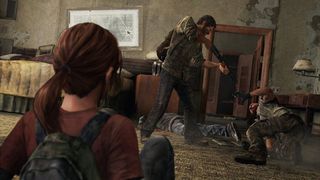Opinion: Why E3's constant stream of identikit brutality saw me embarrassed by this industry for the first time
And the generic in-game violence isn't even the REAL problem
A man lies on the ground begging for his life. His pleas are met only with the cold, uncompromising metal of a shotgun barrel as it hammers into his skull. A moment later, nose meets end of barrel, trigger clicks, and head is detonated at excruciatingly intimate range. A crowd full of braying industry ‘professionals’ whoop, cheer, laugh and honk like seals. I get really uncomfortable.
All of the above of course occurred in and around Sony’s on-stage E3 demo of Naughty Dog’s The Last of Us. Previous to this particular outburst of jubilance and brain-matter, the audience had responded like a winning sports crowd as a 14-year-old girl’s violent outburst had facilitated another man to have his head cracked repeatedly into the corner of a table until brain failure led to either unconsciousness or death. It didn’t matter which.

Above: The violence of this scene is not a problem. What people seem to be getting out of it is
Now please do not get me wrong here. I’m not joining the hysterical tabloid anti-violence brigade. I’ll support any sort of extreme content as long as it’s contextually sound, and while I’m totally behind the idea of fully-enforced age certification on media, I will not stand for censorship. You wouldn’t believe the size and severity of my much-prized collection of horror cinema, and hell, I grew up in the ‘80s, fuggodsake. You can probably guess the kind of gleefully violent OTT nonsense that informed my early love of film. But “contextual” is the most important word in this paragraph. The intent of - and landscape around - any kind of media content is what matters, not the content itself. And so, that in mind, there are a few things about this year’s E3 that have made me uneasy.
For a start there’s the fact that E3 2012, more than any recent one I can remember, seemed to be all about the killing. Beyond The Last of Us, we also had Splinter Cell, Far Cry, Tomb Raider, Resident Evil and Watch Dogs, and all seemed to present me with nothing but one long parade of close-up throat-stabbings and skull-crackings. Games, like any other medium, have the right to be violent. I get that, and I’m fine with it. But there seemed to be a particular brand of intimate, brutal, one-on-one pain infliction defining this year’s show. It was everywhere, it was rendered with relish, and it was the constant (in fact sole) punctuation between each and every one of the never-ending string of explosions that made up the beat to this year’s song and dance.
I was going to make a compilation video to sum up my feelings towards this year’s E3, but this guy has already done it as well as I ever could. When I think about E3 2012, this is exactly what bursts through my mind:
Admittedly, in isolation probably none of these games’ content would bother me as much as it has at E3. The effect of said games is intensified by their concentrated, close-proximity presentation over a mere couple of days at the same event. But unfortunately that very proximity also raises yet another problem. It draws a direct comparison between the titles in question, and starkly shows up the intense similarities between their demos.
Sign up to the GamesRadar+ Newsletter
Weekly digests, tales from the communities you love, and more
Think about those games I’ve listed. Splinter Cell. Far Cry. Tomb Raider. Resident Evil. A few years ago their franchises couldn’t have been more distinct from each other. Now? Stealth-kill leads to cover-shooting bit, leads to explosion leads to more cover-shooting and a bigger explosion, leads to a brutal, intensely directed, interactive execution scene. That model can be nigh-seamlessly applied to the pacing and choreography of almost all the big demos at E3 2012, including those of new IP.
Of course, with only minutes to make an impression at a show as big as E3, the old axiom of “Show them the most exciting bit and get out” always applies, particularly to one-off on-stage demos. But that doesn’t help. In fact it only further emphasises the issue that across the board, whatever the game, whatever the franchise history, whatever the supposed values of the supposed genre, exactly this same identikit violence is what publishers and (presumably) developers now consider “the most exciting bit”.

Above: Sam Fisher or Lara Croft. It doesn't matter. Everyone acts like Marcus Fenix now
And the worst part? Going off the evidence of the conference footage I’ve seen streamed from the show, that thinking seems to have worked all too well. And that’s starting to scare the crap out of me.
Because my real point, the point that spurred me on to write this feature, is not strictly the content of the big games on show this year. It’s the immediate audience reaction to them. It seems that the more intense the violence on show, the more likely the crowd is to whoop and cheer, regardless of the context or the quality of what is on show. That would be depressing if I was watching a public demonstration, but all too often this year I’ve seen this kind of behaviour during press conferences. That means an audience made up of games journalists. Industry professionals. The supposedly insightful, articulate experts and ambassadors who champion gaming as a mature, ever-developing narrative medium.
Like I said, it scares the crap out of me.

My next Metroidvania kick is an ingenious mix of Zelda-like exploration, twin-stick combat, and pitch-perfect controls – with 97% positive Steam user reviews

Stellar Blade keeps fixing things that bothered me when I reviewed it – now including "input time for basic attacks, as well as the timing of blocking and parrying"
Most Popular




